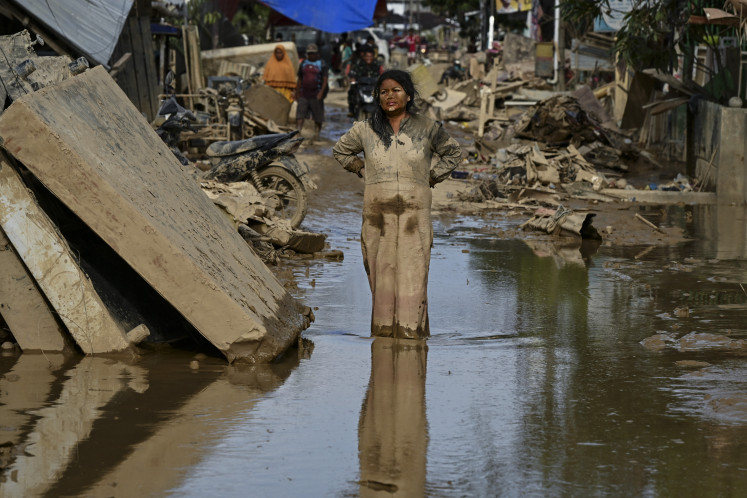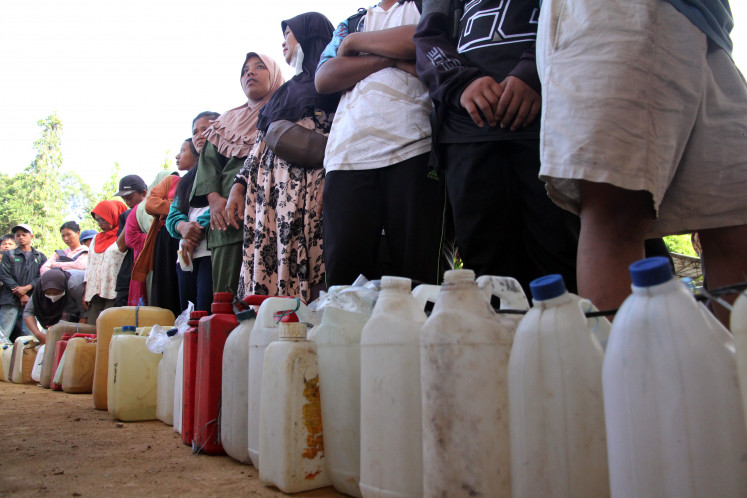Popular Reads
Top Results
Can't find what you're looking for?
View all search resultsPopular Reads
Top Results
Can't find what you're looking for?
View all search results‘I can walk… because I have legs’ Putu Oka Sukanta’s novel ‘Spaces’
“I can walk, not because someone made a path for me, but because I have legs
Change text size
Gift Premium Articles
to Anyone
“I can walk, not because someone made a path for me, but because I have legs.”
I consider this the defining statement in Spaces, the English-language version of Putu Oka Sukanta’s 2018 Celah.
The author himself describes his book as “a work that weaves together elements of fact and the workings of the imagination”, i.e. a novel.
A caveat: I have known Putu for over 30 years and know much about his life (and he mine!). I cannot read the book as fiction as there are events in the novel that I have seen with my own eyes, and conversations I have heard with my own ears.
Hopefully, the fact that I know the author so well still enables me both to review the book objectively, and also write about a man I consider an older brother and an inspiration.
First, the title. Celah encapsulates the essence of the book as in Indonesian it means both “gap” (literally or metaphorically) and “opportunity in or from a difficult situation”. Putu’s life, simply put, is a story of how he navigates between the two.
His life is full of “gaps”, most notably the time he was imprisoned between 1966 and 1976 without trial for being a member of the Institute for the People’s Culture (Lekra), often considered to be the cultural wing of the Indonesian Communist Party (PKI). The PKI was annihilated in 1965 for allegedly staging a coup. Many scholars and writers, including Putu in Space, have provided alternative accounts of the New Order military version of events which justified 32 years of the oppressive Soeharto regime.
Unfortunately, the title Space in English does not have the same multidimensional meaning of Celah. While Keith Foulcher, the translator, did a marvelous job, “space” doesn’t quite have the same connotation as celah as indeed there is no exact equivalent in English.
“I can walk, not because someone made a path for me, but because I have legs.”
By a cruel twist of political fate, Putu’s life path was blocked for 10 years, yet there were many celah: he created opportunities, forged a path and opened spaces for himself.
While in prison, he studied acupuncture, which he continues to practice until now. And of course, his personal experience as a political prisoner as well as that of other tapol (political prisoners) has been a mother lode of inspiration and material, enabling him to write several books of both prose and poetry, which catapulted him into international fame.
His books have been translated into English, French and German, and he has often been invited to speak abroad, which the protagonist in Spaces also does.
Spaces cannot be separated from Merajut Harkat (The Threads of Dignity, 1999) and Istana Jiwa (Palace of the Soul, 2012). They form a trilogy that “explores the ongoing legacy of the horror that befell Indonesia in the years 1965 and 1966 […] and how the tapol struggle to maintain their integrity in various ways”.
He told me, “Threads is about the lives of tapol in military camps and prisons […] Palace is about the women and children of tapol outside of prison who struggle to live under the pressures of the New Order”.
Space contains reflections and accounts of the life Putu led after his release from prison: the dialectic of life presented in a jumpy stream of consciousness, scrapbooky sort of way. For this reason, the book can at times feel disjointed.
To better understand and appreciate Spaces, it helps to know the background of Indonesian history, especially the 1965-1966 period and the early days of the New Order.
In Spaces, you will find mundane personal conversations, prosaic diary-like entries, travelogues (mainly as a speaker at international writers festivals or human rights conferences), discussions on political ideology, advice on natural healing (acupuncture, herbal medicine and HIV/AIDS), powerful poetry, gems of philosophical reflection and to juice things up, accounts of passionate lovemaking that throw all notions of conventional morality to the winds.
Putu’s humanism is apparent in Spaces. Precisely due to the inhumane treatment he received, he identifies strongly with other marginalized minority groups who are also treated inhumanely: people with HIV/AIDS, sex workers, members of the lesbian, gay, bisexual and transgender (LGBT) community and of course women, who are still considered “the second sex”.
“I can walk, not because someone made a path for me, but because I have legs.”
“Legs” is a metaphor for Putu’s indomitable spirit, his multiple talents, his resilience in the face of adversity, while Spaces is about truths sifted out through the dialectic of life and the wisdom of time.
Being a writer and poet, in the end, is also being a healer — something we all need to be, at least for ourselves.
Spaces will be launched on Wednesday, at the Goethe Institute in Jakarta, part of a celebration of Putu’s 80th birthday. Selamat ulang tahun (happy birthday), Putu!
____________
'Spaces'
By Putu Oka Sukanta
Published by Lontar 2019
194 pages










